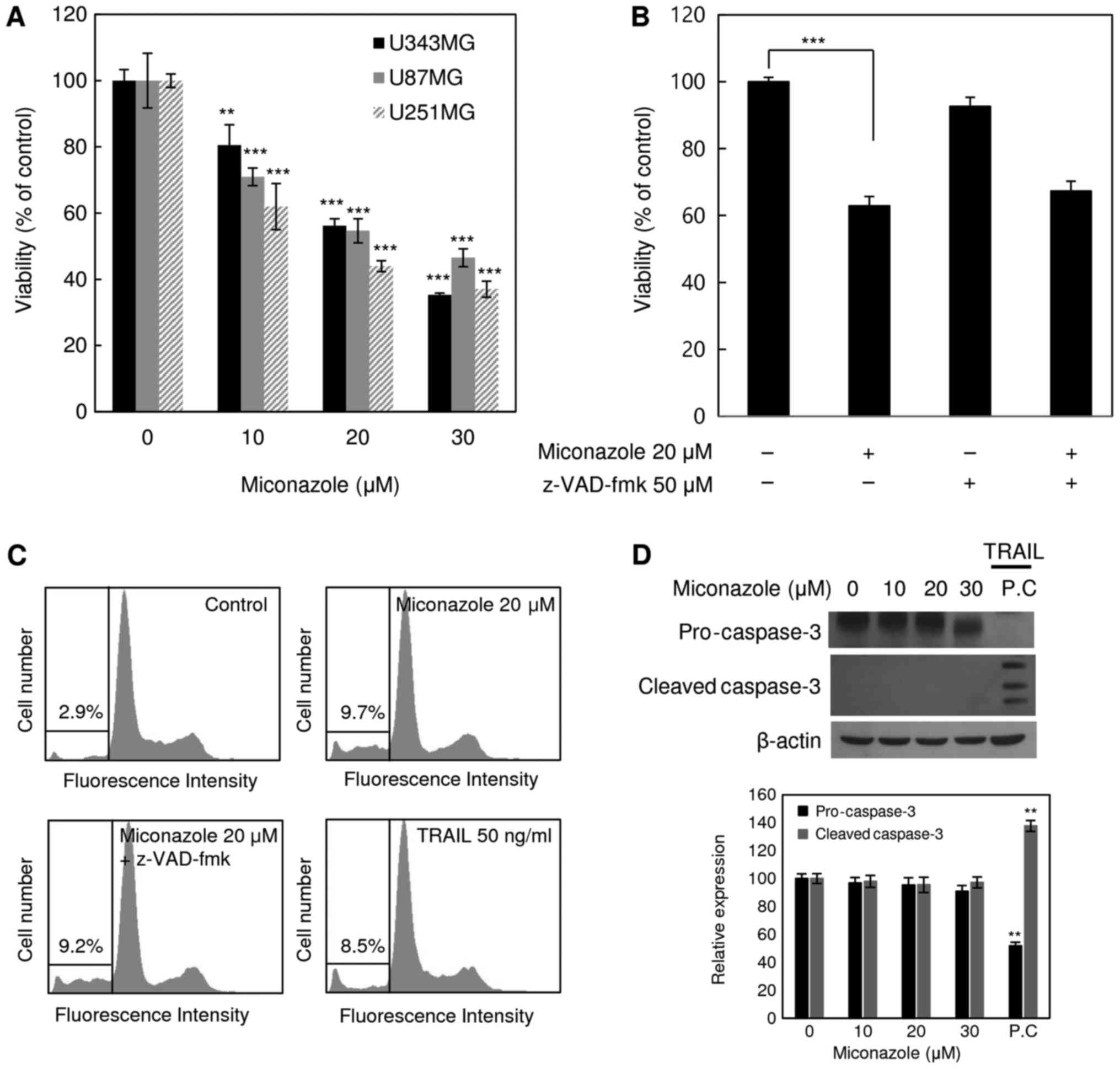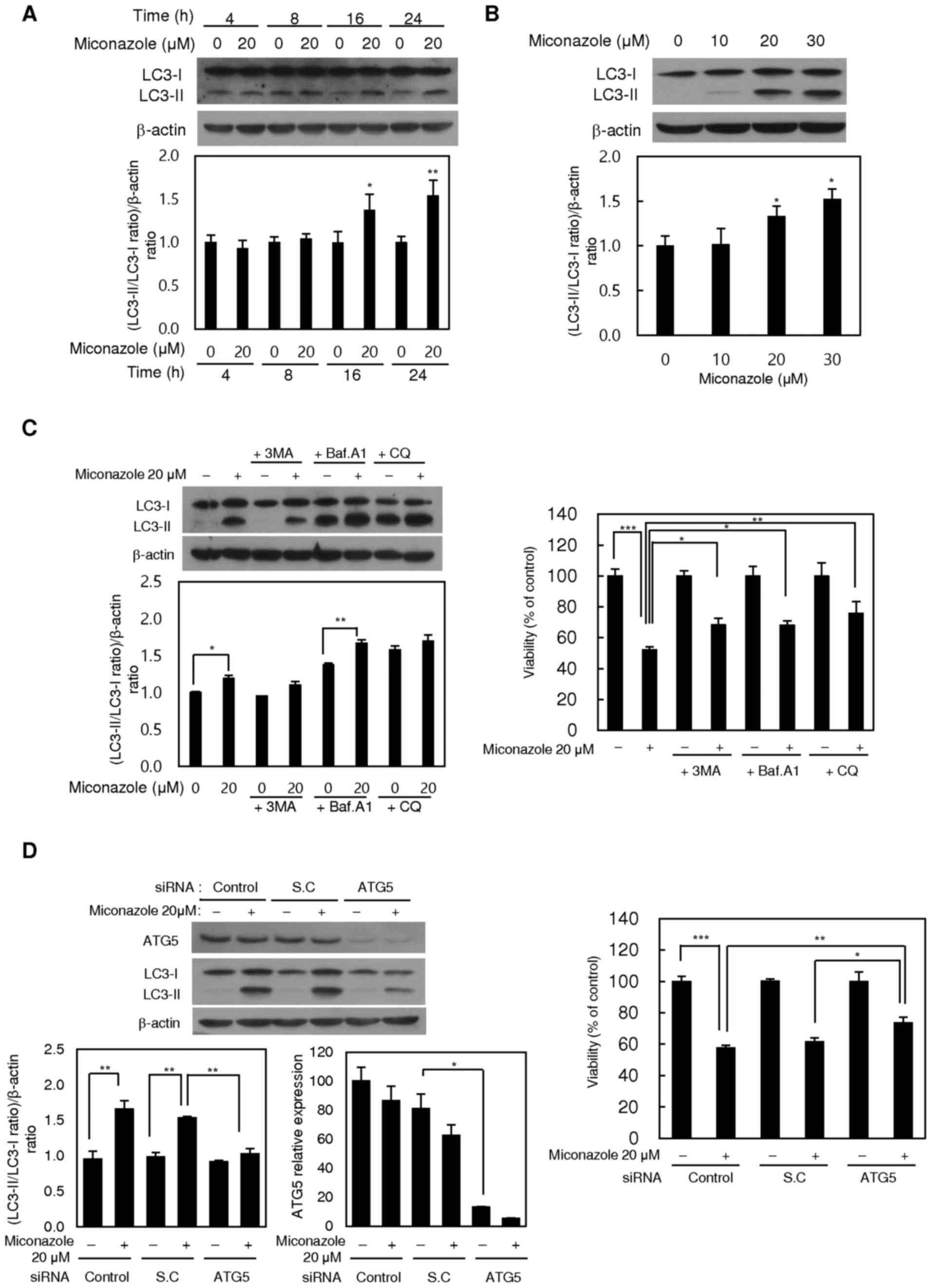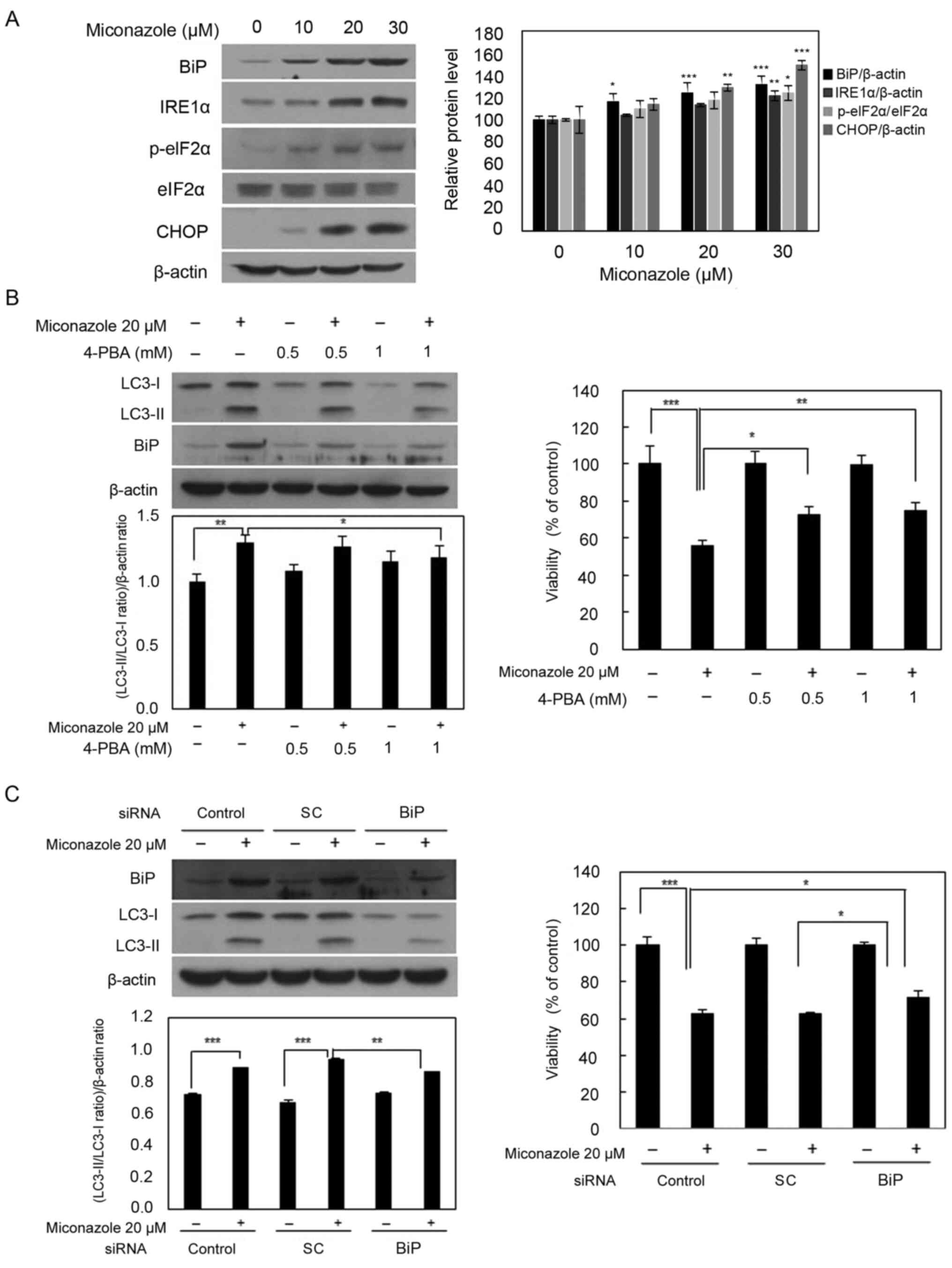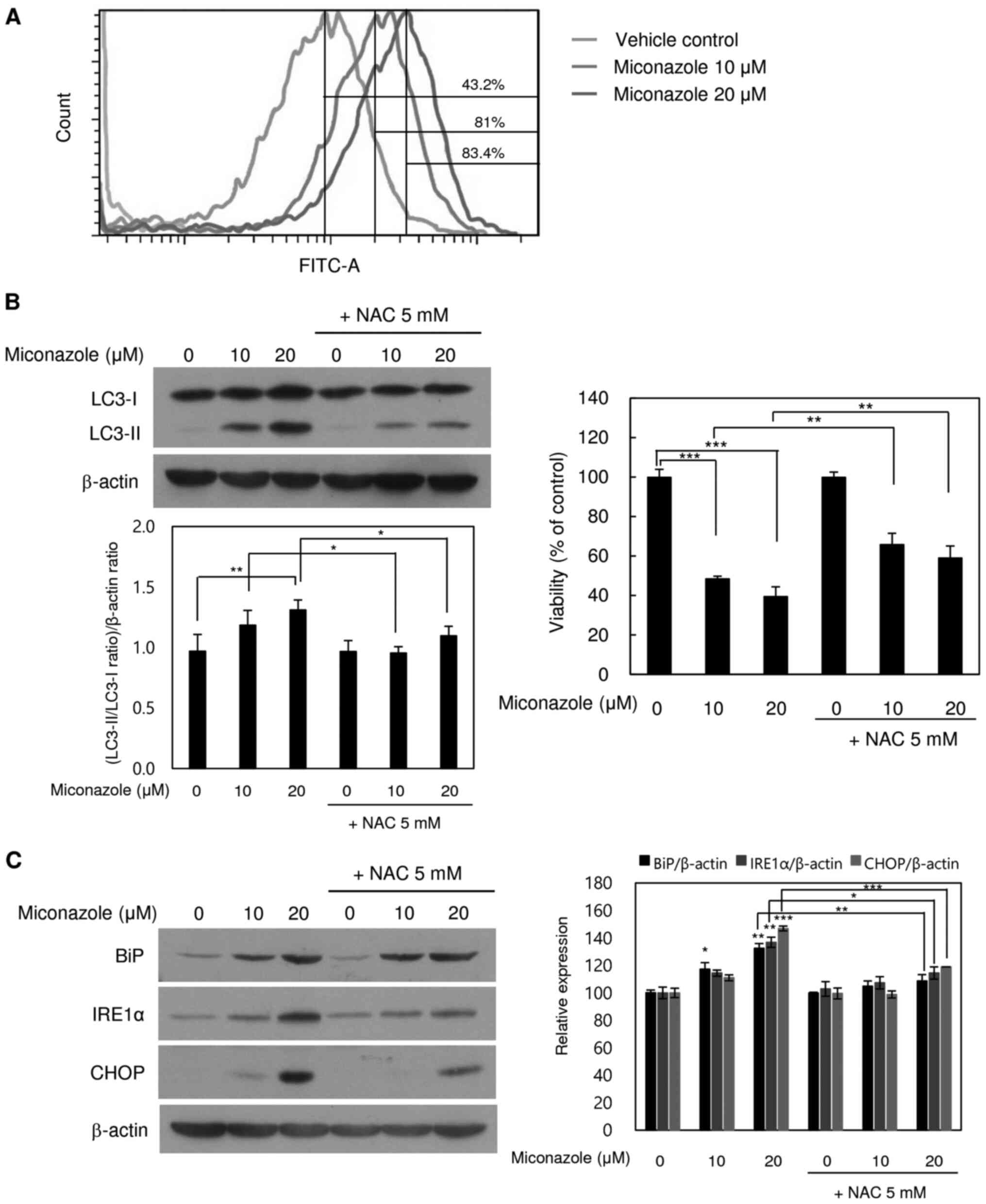|
1
|
Mizushima N and Komatsu M: Autophagy:
Renovation of cells and tissues. Cell. 147:728–741. 2011.
View Article : Google Scholar : PubMed/NCBI
|
|
2
|
Levine B and Klionsky DJ: Development by
self-digestion: Molecular mechanisms and biological functions of
autophagy. Dev Cell. 6:463–477. 2004. View Article : Google Scholar : PubMed/NCBI
|
|
3
|
He C and Klionsky DJ: Regulation
mechanisms and signaling pathways of autophagy. Annu Rev Genet.
43:67–93. 2009. View Article : Google Scholar : PubMed/NCBI
|
|
4
|
Shao Y, Gao Z, Marks PA and Jiang X:
Apoptotic and autophagic cell death induced by histone deacetylase
inhibitors. Proc Natl Acad Sci USA. 101:18030–18035. 2004.
View Article : Google Scholar : PubMed/NCBI
|
|
5
|
Mazure NM and Pouysségur J:
Hypoxia-induced autophagy: Cell death or cell survival? Curr Opin
Cell Biol. 22:177–180. 2010. View Article : Google Scholar : PubMed/NCBI
|
|
6
|
Descloux C, Ginet V, Clarke PG, Puyal J
and Truttmann AC: Neuronal death after perinatal cerebral
hypoxia-ischemia: Focus on autophagy-mediated cell death. Int J Dev
Neurosci. 45:75–85. 2015. View Article : Google Scholar : PubMed/NCBI
|
|
7
|
Maiuri MC, Zalckvar E, Kimchi A and
Kroemer G: Self-eating and self-killing: Crosstalk between
autophagy and apoptosis. Nat Rev Mol Cell Biol. 8:741–752. 2007.
View Article : Google Scholar : PubMed/NCBI
|
|
8
|
Mathew R, Karantza-Wadsworth V and White
E: Role of autophagy in cancer. Nat Rev Cancer. 7:961–967. 2007.
View Article : Google Scholar : PubMed/NCBI
|
|
9
|
Furtado CM, Marcondes MC, Sola-Penna M, de
Souza ML and Zancan P: Clotrimazole preferentially inhibits human
breast cancer cell proliferation, viability and glycolysis. PLoS
One. 7:e304622012. View Article : Google Scholar : PubMed/NCBI
|
|
10
|
Gupta A, Unadkat JD and Mao Q:
Interactions of azole antifungal agents with the human breast
cancer resistance protein (BCRP). J Pharm Sci. 96:3226–3235. 2007.
View Article : Google Scholar : PubMed/NCBI
|
|
11
|
Shahbazfar AA, Zare P, Ranjbaran M,
Tayefi-Nasrabadi H, Fakhri O, Farshi Y, Shadi S and Khoshkerdar A:
A survey on anticancer effects of artemisinin, iron, miconazole,
and butyric acid on 5637 (bladder cancer) and 4T1 (Breast cancer)
cell lines. J Cancer Res Ther. 10:1057–1062. 2014. View Article : Google Scholar : PubMed/NCBI
|
|
12
|
Park JY, Jung HJ, Seo I, Jha BK, Suh SI,
Suh MH and Baek WK: Translational suppression of HIF-1α by
miconazole through the mTOR signaling pathway. Cell Oncol (Dordr).
37:269–279. 2014. View Article : Google Scholar : PubMed/NCBI
|
|
13
|
Chang HT, Chen WC, Chen JS, Lu YC, Hsu SS,
Wang JL, Cheng HH, Cheng JS, Jiann BP, Chiang AJ, et al: Effect of
miconazole on intracellular Ca2+ levels and
proliferation in human osteosarcoma cells. Life Sci. 76:2091–2101.
2005. View Article : Google Scholar : PubMed/NCBI
|
|
14
|
Wu CH, Jeng JH, Wang YJ, Tseng CJ, Liang
YC, Chen CH, Lee HM, Lin JK, Lin CH, Lin SY, et al: Antitumor
effects of miconazole on human colon carcinoma xenografts in nude
mice through induction of apoptosis and G0/G1 cell cycle arrest.
Toxicol Appl Pharmacol. 180:22–35. 2002. View Article : Google Scholar : PubMed/NCBI
|
|
15
|
Yuan SY, Shiau MY, Ou YC, Huang YC, Chen
CC, Cheng CL, Chiu KY, Wang SS and Tsai KJ: Miconazole induces
apoptosis via the death receptor 5-dependent and
mitochondrial-mediated pathways in human bladder cancer cells.
Oncol Rep. 37:3606–3616. 2017. View Article : Google Scholar : PubMed/NCBI
|
|
16
|
Chengzhu WU, Gao M, Shen L, Bohan LI, Bai
X, Gui J, Hongmei LI, Huo Q and Tao MA: Miconazole triggers various
forms of cell death in human breast cancer MDA-MB-231 cells.
Pharmazie. 74:290–294. 2019.PubMed/NCBI
|
|
17
|
Kobayashi D, Kondo K, Uehara N, Otokozawa
S, Tsuji N, Yagihashi A and Watanabe N: Endogenous reactive oxygen
species is an important mediator of miconazole antifungal effect.
Antimicrob Agents Chemother. 46:3113–3117. 2002. View Article : Google Scholar : PubMed/NCBI
|
|
18
|
Lee KP, Kim JE and Park WH: Cytoprotective
effect of rhamnetin on miconazole-induced H9c2 cell damage. Nutr
Res Pract. 9:586–591. 2015. View Article : Google Scholar : PubMed/NCBI
|
|
19
|
Yeo IJ, Yun J, Son DJ, Han SB and Hong JT:
Antifungal drug miconazole ameliorated memory deficits in a mouse
model of LPS-induced memory loss through targeting iNOS. Cell Death
Dis. 11:6232020. View Article : Google Scholar : PubMed/NCBI
|
|
20
|
Chen LD, Liu ZH, Zhang LF, Yao JN and Wang
CF: Sanggenon C induces apoptosis of colon cancer cells via
inhibition of NO production, iNOS expression and ROS activation of
the mitochondrial pathway. Oncol Rep. 38:2123–2131. 2017.
View Article : Google Scholar : PubMed/NCBI
|
|
21
|
Holotiuk VV, Kryzhanivska AY, Churpiy IK,
Tataryn BB and Ivasiutyn DY: Role of nitric oxide in pathogenesis
of tumor growth and its possible application in cancer treatment.
Exp Oncol. 41:210–215. 2019.PubMed/NCBI
|
|
22
|
Liu R, Li J, Zhang T, Zou L, Chen Y, Wang
K, Lei Y, Yuan K, Li Y, Lan J, et al: Itraconazole suppresses the
growth of glioblastoma through induction of autophagy: Involvement
of abnormal cholesterol trafficking. Autophagy. 10:1241–1255. 2014.
View Article : Google Scholar : PubMed/NCBI
|
|
23
|
Jung HJ, Seo I, Casciello F, Jacquelin S,
Lane SW, Suh SI, Suh MH, Lee JS and Baek WK: The anticancer effect
of chaetocin is enhanced by inhibition of autophagy. Cell Death
Dis. 7:e20982016. View Article : Google Scholar : PubMed/NCBI
|
|
24
|
Kabeya Y, Mizushima N, Ueno T, Yamamoto A,
Kirisako T, Noda T, Kominami E, Ohsumi Y and Yoshimori T: LC3, a
mammalian homologue of yeast Apg8p, is localized in autophagosome
membranes after processing. EMBO J. 19:5720–5728. 2000. View Article : Google Scholar : PubMed/NCBI
|
|
25
|
Won KJ, Lin HY, Jung S, Cho SM, Shin HC,
Bae YM, Lee SH, Kim HJ, Jeon BH and Kim B: Antifungal miconazole
induces cardiotoxicity via inhibition of APE/Ref-1-related pathway
in rat neonatal cardiomyocytes. Toxicol Sci. 126:298–305. 2012.
View Article : Google Scholar : PubMed/NCBI
|
|
26
|
Portt L, Norman G, Clapp C, Greenwood M
and Greenwood MT: Anti-apoptosis and cell survival: A review.
Biochim Biophys Acta. 1813:238–259. 2011. View Article : Google Scholar : PubMed/NCBI
|
|
27
|
Tanaka S, Hikita H, Tatsumi T, Sakamori R,
Nozaki Y, Sakane S, Shiode Y, Nakabori T, Saito Y, Hiramatsu N, et
al: Rubicon inhibits autophagy and accelerates hepatocyte apoptosis
and lipid accumulation in nonalcoholic fatty liver disease in mice.
Hepatology. 64:1994–2014. 2016. View Article : Google Scholar : PubMed/NCBI
|
|
28
|
Basu A: Regulation of autophagy by protein
kinase C-ε in breast cancer cells. Int J Mol Sci. 21:42472020.
View Article : Google Scholar
|
|
29
|
Keil E, Höcker R, Schuster M, Essmann F,
Ueffing N, Hoffman B, Liebermann DA, Pfeffer K, Schulze-Osthoff K
and Schmitz I: Phosphorylation of Atg5 by the Gadd45β-MEKK4-p38
pathway inhibits autophagy. Cell Death Differ. 20:321–332. 2013.
View Article : Google Scholar : PubMed/NCBI
|
|
30
|
Yu HE, Wang F, Yu F, Zeng ZL, Wang Y, Lu
YX, Jin Y, Wang DS, Qiu MZ, Pu HY, et al: Suppression of fumarate
hydratase activity increases the efficacy of cisplatin-mediated
chemotherapy in gastric cancer. Cell Death Dis. 10:4132019.
View Article : Google Scholar : PubMed/NCBI
|
|
31
|
Roan CJ, Chou CT, Liang WZ, Chang HT, Kuo
DH, Kuo CC, Chen FA, Shieh P and Jan CR: Effect of miconazole on
[Ca2+]i and cytotoxicity in ZR-75-1 human breast cancer
cells. Chin J Physiol. 58:377–384. 2015. View Article : Google Scholar : PubMed/NCBI
|
|
32
|
Hirsch T, Marchetti P, Susin SA,
Dallaporta B, Zamzami N, Marzo I, Geuskens M and Kroemer G: The
apoptosis-necrosis paradox. Apoptogenic proteases activated after
mitochondrial permeability transition determine the mode of cell
death. Oncogene. 15:1573–1581. 1997. View Article : Google Scholar : PubMed/NCBI
|
|
33
|
Sarin A, Williams MS, Alexander-Miller MA,
Berzofsky JA, Zacharchuk CM and Henkart PA: Target cell lysis by
CTL granule exocytosis is independent of ICE/Ced-3 family
proteases. Immunity. 6:209–215. 1997. View Article : Google Scholar : PubMed/NCBI
|
|
34
|
Yorimitsu T and Klionsky DJ: Endoplasmic
reticulum stress: A new pathway to induce autophagy. Autophagy.
3:160–162. 2007. View Article : Google Scholar : PubMed/NCBI
|
|
35
|
Ding WX, Ni HM, Gao W, Hou YF, Melan MA,
Chen X, Stolz DB, Shao ZM and Yin XM: Differential effects of
endoplasmic reticulum stress-induced autophagy on cell survival. J
Biol Chem. 282:4702–4710. 2007. View Article : Google Scholar : PubMed/NCBI
|
|
36
|
Kouroku Y, Fujita E, Tanida I, Ueno T,
Isoai A, Kumagai H, Ogawa S, Kaufman RJ, Kominami E and Momoi T: ER
stress (PERK/eIF2alpha phosphorylation) mediates the
polyglutamine-induced LC3 conversion, an essential step for
autophagy formation. Cell Death Differ. 14:230–239. 2007.
View Article : Google Scholar : PubMed/NCBI
|
|
37
|
Yin JJ, Xie G, Zhang N and Li Y:
Inhibiting autophagy promotes endoplasmic reticulum stress and the
ROS induced nod like receptor 3 dependent proinflammatory response
in HepG2 cells. Mol Med Rep. 14:3999–4007. 2016. View Article : Google Scholar : PubMed/NCBI
|
|
38
|
Ding WX, Ni HM, Gao W, Yoshimori T, Stolz
DB, Ron D and Yin XM: Linking of autophagy to ubiquitin-proteasome
system is important for the regulation of endoplasmic reticulum
stress and cell viability. Am J Pathol. 171:513–524. 2007.
View Article : Google Scholar : PubMed/NCBI
|
|
39
|
Hwang MS and Baek WK: Glucosamine induces
autophagic cell death through the stimulation of ER stress in human
glioma cancer cells. Biochem Biophys Res Commun. 399:111–116. 2010.
View Article : Google Scholar : PubMed/NCBI
|
|
40
|
Chen Y, Azad MB and Gibson SB: Superoxide
is the major reactive oxygen species regulating autophagy. Cell
Death Differ. 16:1040–1052. 2009. View Article : Google Scholar : PubMed/NCBI
|
|
41
|
Fleury C, Mignotte B and Vayssière JL:
Mitochondrial reactive oxygen species in cell death signaling.
Biochimie. 84:131–141. 2002. View Article : Google Scholar : PubMed/NCBI
|
|
42
|
Miki H, Uehara N, Kimura A, Sasaki T, Yuri
T, Yoshizawa K and Tsubura A: Resveratrol induces apoptosis via
ROS-triggered autophagy in human colon cancer cells. Int J Oncol.
40:1020–1028. 2012. View Article : Google Scholar : PubMed/NCBI
|
|
43
|
Poillet-Perez L, Despouy G,
Delage-Mourroux R and Boyer-Guittaut M: Interplay between ROS and
autophagy in cancer cells, from tumor initiation to cancer therapy.
Redox Biol. 4:184–192. 2015. View Article : Google Scholar : PubMed/NCBI
|
|
44
|
Zhou DR, Eid R, Miller KA, Boucher E,
Mandato CA and Greenwood MT: Intracellular second messengers
mediate stress inducible hormesis and programmed cell death: A
review. Biochim Biophys Acta Mol Cell Res. 1866:773–792. 2019.
View Article : Google Scholar : PubMed/NCBI
|
|
45
|
Delattin N, Cammue BP and Thevissen K:
Reactive oxygen species-inducing antifungal agents and their
activity against fungal biofilms. Future Med Chem. 6:77–90. 2014.
View Article : Google Scholar : PubMed/NCBI
|
|
46
|
Kumar CG and Poornachandra Y: Biodirected
synthesis of Miconazole-conjugated bacterial silver nanoparticles
and their application as antifungal agents and drug delivery
vehicles. Colloids Surf B Biointerfaces. 125:110–119. 2015.
View Article : Google Scholar : PubMed/NCBI
|
|
47
|
Zhu CX, Yan L, Wang XJ, Miao Q, Li XX,
Yang F, Cao YB, Gao PH, Bi XL and Jiang YY: Transposition of the
Zorro2 retrotransposon is activated by miconazole in Candida
albicans. Biol Pharm Bull. 37:37–43. 2014. View Article : Google Scholar : PubMed/NCBI
|
|
48
|
Tsai TF, Chen PC, Lin YC, Chou KY, Chen
HE, Ho CY, Lin JF and Hwang TI: Miconazole contributes to NRF2
activation by noncanonical P62-KEAP1 pathway in bladder cancer
cells. Drug Des Devel Ther. 14:1209–1218. 2020. View Article : Google Scholar : PubMed/NCBI
|


















